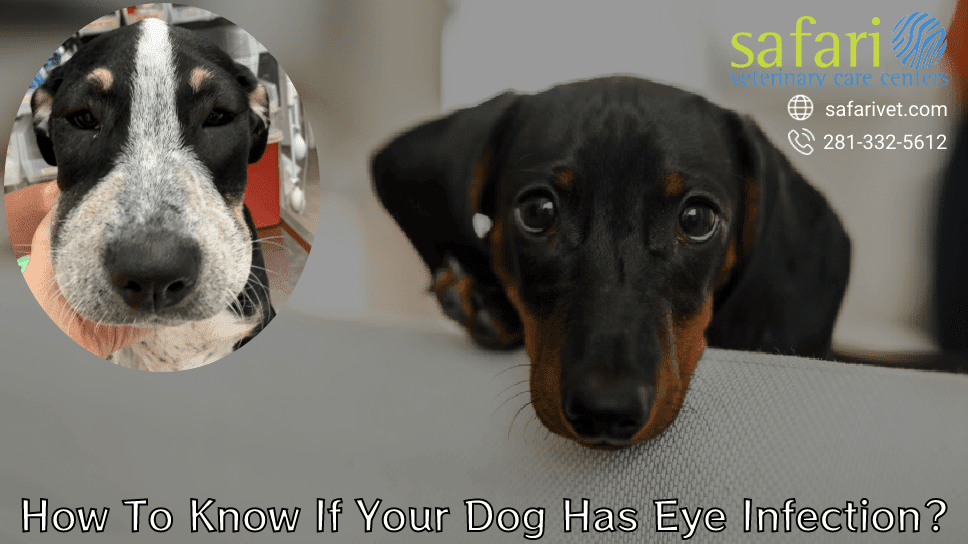There are a variety of causes for your dog's eye infection, but regardless of the reason, eye infections in dogs can vary from annoying to severe and require quick treatment to avoid consequences. Our SafariVet experts discuss some of the causes of canine eye infections and how to treat them.
Overview
Eye infections in dogs may be as painful as they are in people. Allergies, foreign materials (such as sand or grass seeds), viruses, bacteria, and injuries are all potential causes of eye infections in dogs.
Although your dog's eye infection is unlikely to be fatal, it can impair their vision and negatively damage their lives, giving them pain and misery. In addition, eye disorders in dogs can worsen quickly, so contact your veterinarian or, if it is after hours, the local Vets Now pet emergency facility immediately.
How to know if your dog has an eye infection
If your dog's eyes are watering more than usual, or you observe yellow, green, or white-colored discharge, they may have an eye infection. Pawing at their eye, blinking more than usual, swelling, redness, and squinting are further indicators of eye infections in dogs.
Because of the numerous potential causes, the symptoms of eye infections vary greatly. Therefore, if your dog exhibits signs of eye pain or you observe anything strange, you should always seek the advice of a veterinarian.
Why It Happens
Epiphora is the medical word for excessive tear production in your dog's eyes. For example, if your dog's eyes are watering excessively, the surplus tears will flow down their face rather than drain away, causing irritation, discoloration, odor, and infection.
Excessive tearing in dogs can be caused by an eye infection or other eye discomfort (in the same way our eyes water to protect us from irritants).
It's possible that your dog's eyes are draining tears effectively, which is a feature in some dog breeds (such as some flat-faced breeds), but it might also be related to other problems.
If your dog has runny or watery eyes, the best thing to do is seek guidance from your veterinarian.
Dog Eye Infections: What Causes Them?
- Irritants like shampoo
- Foreign matter such as grass seed, dirt, grass seed, or the dog's hair
- Cut or scratch on the cornea
- Trauma
- Parasites
- Fungus
- Bacteria
- Viruses
Eye Infections Commonly Found in Dogs
Several eye infections can cause discomfort, redness, or light sensitivity in your canine pet. The following are four of the most prevalent conditions of dog eye disease:
- Corneal inflammatory disease
- Tear gland problems or physical eyelid anomalies
- Uveitis is an inflammation of one or more of the eye's internal tissues, such as the iris, choroid, or ciliary body.
- Conjunctivitis (pink eye) is an infection of the mucous membrane covering the outside of the eyeball and the inside of the eyelids.
Not all eye issues are infections
In certain situations, your dog may exhibit symptoms of an eye infection while suffering from a different sort of eye disease.
Glaucoma, tear duct difficulties or eye abnormalities, dry eye, vitamin insufficiency, exposure to or ingestion of toxins, tumors, cherry eye, or structural problems with the watch itself, such as entropion, are some of the eye disorders in dogs that are regularly misdiagnosed as illnesses by pet owners.
These eye disorders, like infections, can be uncomfortable and need prompt veterinarian attention.
Dog Eye Infection Treatment
Treatment for your dog's eye infection will vary depending on the underlying cause. Still, it may include a mix of topical and oral therapies such as antibiotics or anti-inflammatory drugs, a single topical medication, or, in some circumstances, surgery.
- Antibiotics and eye drops are usually administered if a bacterial infection is determined to be causing your dog's eye illness.
- When allergies are suspected of causing a dog's eye illness, the doctor will most likely prescribe an antihistamine to assist in calming your pup's eyes.
- If a foreign substance or debris is bothering your dog's eye, your doctor may need to remove it while your dog is sedated or under local anesthesia.
- Blocked tear ducts are usually treated with surgery, eye medications, and antibiotics.
- Dry eye or keratoconjunctivitis sicca (KCS) in dogs may be treated with drugs such as cyclosporine or tacrolimus to promote tear production.
- Entropion surgery is usually used to repair eyelid or eyelash irregularities that cause the lashes to push against the eyeball.
What should I do if my dog gets an eye infection?
If your dog's eyes are sensitive, irritated, or painful, it's time to take him to the veterinarian in Houston TX.
Your veterinarian will be able to do a comprehensive eye exam to discover the origin of your dog's symptoms and will be able to administer appropriate therapy to help your dog's eyes feel better. If left untreated, eye infections can progress to visual loss.

Comments
Post a Comment